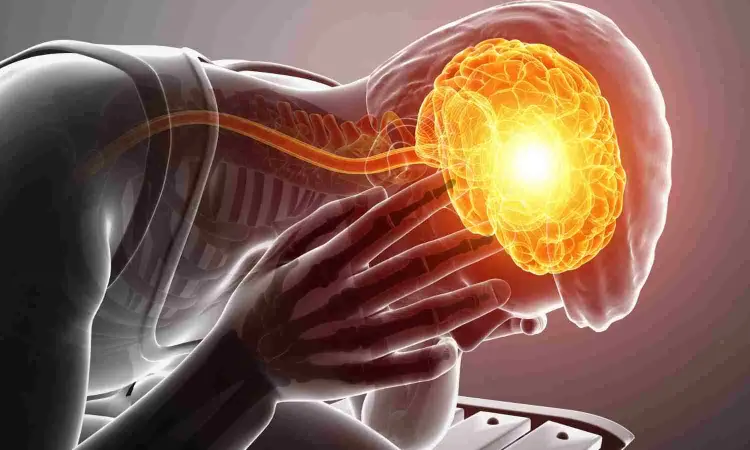- Home
- Medical news & Guidelines
- Anesthesiology
- Cardiology and CTVS
- Critical Care
- Dentistry
- Dermatology
- Diabetes and Endocrinology
- ENT
- Gastroenterology
- Medicine
- Nephrology
- Neurology
- Obstretics-Gynaecology
- Oncology
- Ophthalmology
- Orthopaedics
- Pediatrics-Neonatology
- Psychiatry
- Pulmonology
- Radiology
- Surgery
- Urology
- Laboratory Medicine
- Diet
- Nursing
- Paramedical
- Physiotherapy
- Health news
- Fact Check
- Bone Health Fact Check
- Brain Health Fact Check
- Cancer Related Fact Check
- Child Care Fact Check
- Dental and oral health fact check
- Diabetes and metabolic health fact check
- Diet and Nutrition Fact Check
- Eye and ENT Care Fact Check
- Fitness fact check
- Gut health fact check
- Heart health fact check
- Kidney health fact check
- Medical education fact check
- Men's health fact check
- Respiratory fact check
- Skin and hair care fact check
- Vaccine and Immunization fact check
- Women's health fact check
- AYUSH
- State News
- Andaman and Nicobar Islands
- Andhra Pradesh
- Arunachal Pradesh
- Assam
- Bihar
- Chandigarh
- Chattisgarh
- Dadra and Nagar Haveli
- Daman and Diu
- Delhi
- Goa
- Gujarat
- Haryana
- Himachal Pradesh
- Jammu & Kashmir
- Jharkhand
- Karnataka
- Kerala
- Ladakh
- Lakshadweep
- Madhya Pradesh
- Maharashtra
- Manipur
- Meghalaya
- Mizoram
- Nagaland
- Odisha
- Puducherry
- Punjab
- Rajasthan
- Sikkim
- Tamil Nadu
- Telangana
- Tripura
- Uttar Pradesh
- Uttrakhand
- West Bengal
- Medical Education
- Industry
Is there a link between increased headaches and hotter temperatures for individuals with migraines?

As temperatures rise, so do chances for migraine attacks, according to a new study from a team of researchers at the University of Cincinnati College of Medicine, Icahn School of Medicine at Mount Sinai, Errex Inc. and Teva Pharmaceuticals USA. Inc.
“Weather change is one of the most common trigger factors for migraine,” says Vincent Martin, MD, director of the Headache and Facial Pain Center at UC's Gardner Neuroscience Institute and UC Health physician. He is the study’s lead author and president of the National Headache Foundation.
These findings from the study, which looked at use of Fremanezumab and whether it could prevent headaches caused by temperature increases, will be presented at the American Headache Society’s 66th Annual Scientific Meeting, June 13-16 in San Diego, California.
Produced by Teva Pharmaceuticals USA. Inc., Fremanezumab is sold under the brand name AJOVY®, administered by injection under the skin, and is part of a set of monoclonal antibodies that have hit the market in the past six years to treat migraine in patients. This class of drugs blocks a protein known as CGRP (calcitonin gene-related peptide) which is responsible for transmission of pain in the brain and nervous system.
Researchers cross-referenced 71,030 daily diary records of 660 migraine patients with regional weather data and found that for every temperature increase of 10 degrees Fahrenheit daily, there was a 6% increase in occurrence of any headache. However, during the time periods of Fremanezumab treatment the association completely disappeared.
“This study is the first to suggest that migraine specific therapies that block CGRP may treat weather associated headaches,” says Fred Cohen, a study co-author and assistant professor of medicine at Icahn School of Medicine at Mount Sinai in New York, NY.
Martin adds that if the results are confirmed in future studies the drug therapy has the potential to help many people with weather triggered migraine.
“What we found was that increases in temperature were a significant factor in migraine occurrence across all regions of the United States,” says Martin, also a professor within UC's College of Medicine. “It’s pretty amazing because you think of all the varying weather patterns that occur across the entire country that we’re able to find one that is so significant.”
Al Peterlin, who retired as chief meteorologist at the U.S. Department of Agriculture and co-author of the study, added another thought.
"Hippocrates, the father of medicine, believed that weather and medicine were intimately linked," he says. "A couple thousand of years later, we are proving that weather matters in human health."
Reference:
Is there a link between increased headaches and hotter temperatures for individuals with migraines?, University of Cincinnati, Meeting: 66th Annual Scientific Meeting of the American Headache Society.
Dr Kamal Kant Kohli-MBBS, DTCD- a chest specialist with more than 30 years of practice and a flair for writing clinical articles, Dr Kamal Kant Kohli joined Medical Dialogues as a Chief Editor of Medical News. Besides writing articles, as an editor, he proofreads and verifies all the medical content published on Medical Dialogues including those coming from journals, studies,medical conferences,guidelines etc. Email: drkohli@medicaldialogues.in. Contact no. 011-43720751


